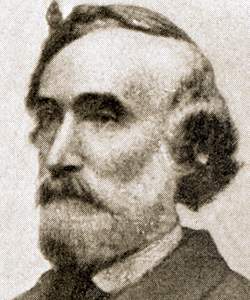Charles Clark (American National Biography)
Scholarship
[Charles Clark] was appointed Jefferson Davis's replacement as major general of Mississippi state troops and on 22 May 1861 accepted a commission as a brigadier general in the Confederate army. He commanded a division under Albert Sidney Johnston at Shiloh, where he was wounded in the shoulder. He later took part in Breckinridge's, assault on the Union lines at Baton Rouge. Here, in August 1862, a bullet shattered his right thigh, crippling him for the rest of his life. He was taken prisoner and paroled in late 1862.
In October 1863, Clark was elected as Mississippi's second and last Confederate governor. Despite a fiery inaugural speech exhorting his fellow Mississippians never to yield, Clark lacked the financial and political resources to shore up the crumbling war effort. Vicksburg and its surrounding plantation districts and Jackson, the state capital, had already been lost to Union forces, and the state government had to relocate to Macon. Clark's efforts to reorganize state forces for defensive purposes were hamstrung by a bankrupt treasury and the breakdown of political control throughout much of the state. His relations with the Confederate government in Richmond quickly became entangled in a controversy over Confederate policies of impressing slaves and suspending the writ of habeas corpus. By late 1864 Clark was a caretaker for a state government whose authority had collapsed, and on 22 May 1865 he formally surrendered the state to Union forces.
In October 1863, Clark was elected as Mississippi's second and last Confederate governor. Despite a fiery inaugural speech exhorting his fellow Mississippians never to yield, Clark lacked the financial and political resources to shore up the crumbling war effort. Vicksburg and its surrounding plantation districts and Jackson, the state capital, had already been lost to Union forces, and the state government had to relocate to Macon. Clark's efforts to reorganize state forces for defensive purposes were hamstrung by a bankrupt treasury and the breakdown of political control throughout much of the state. His relations with the Confederate government in Richmond quickly became entangled in a controversy over Confederate policies of impressing slaves and suspending the writ of habeas corpus. By late 1864 Clark was a caretaker for a state government whose authority had collapsed, and on 22 May 1865 he formally surrendered the state to Union forces.
William L. Barney, "Clark, Charles," American National Biography Online, February 2000, http://www.anb.org/articles/04/04-00234.html.



